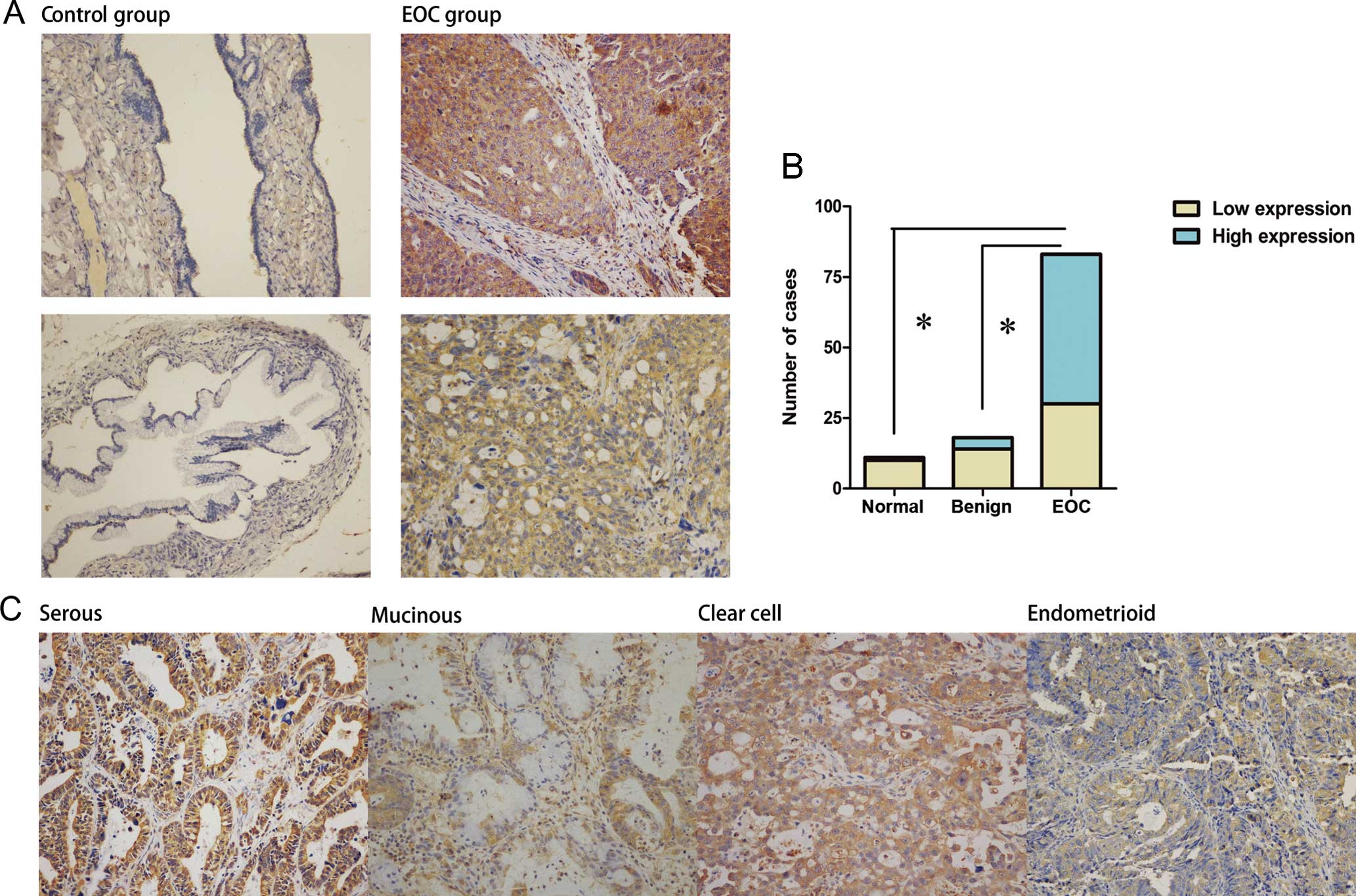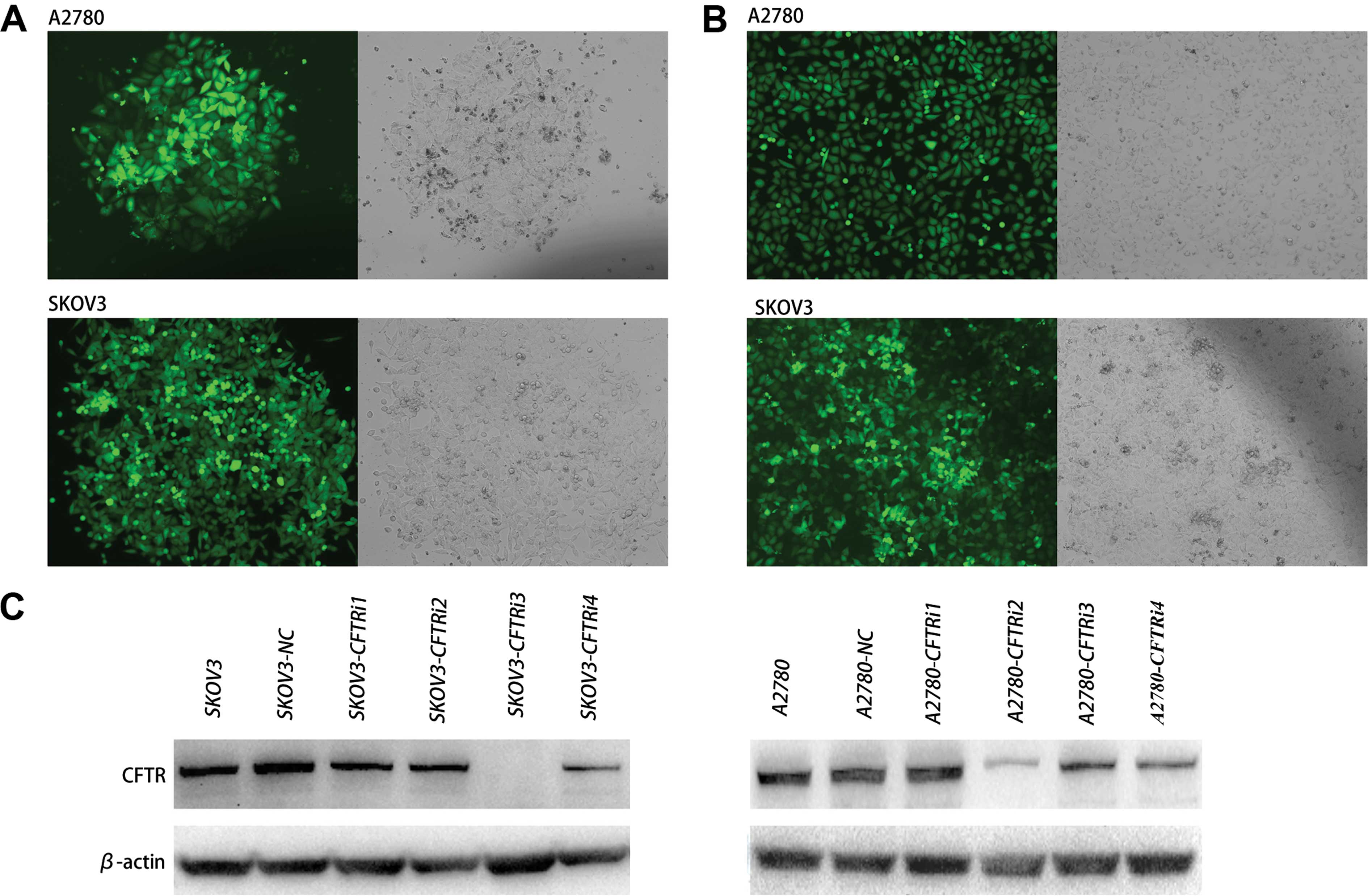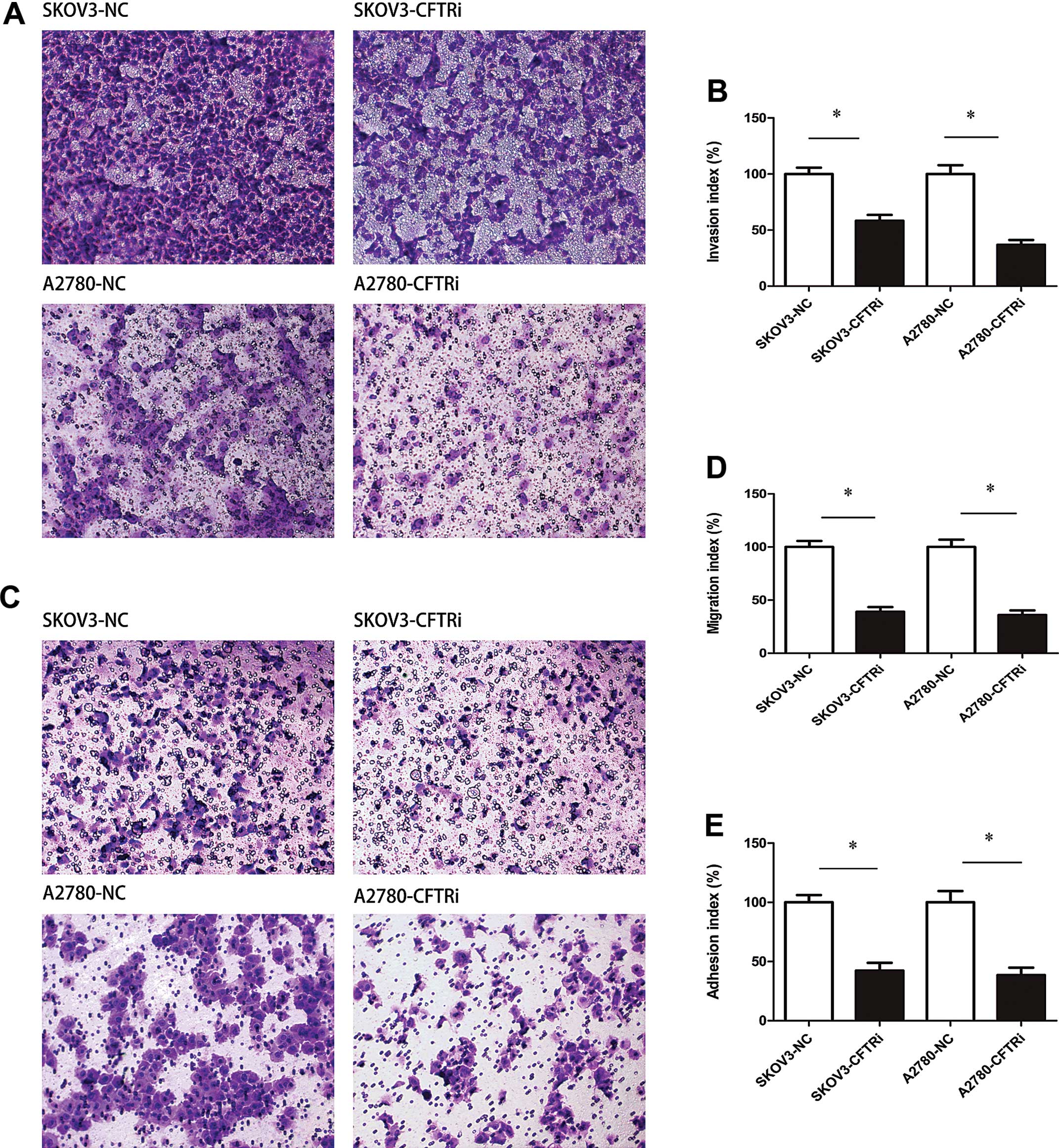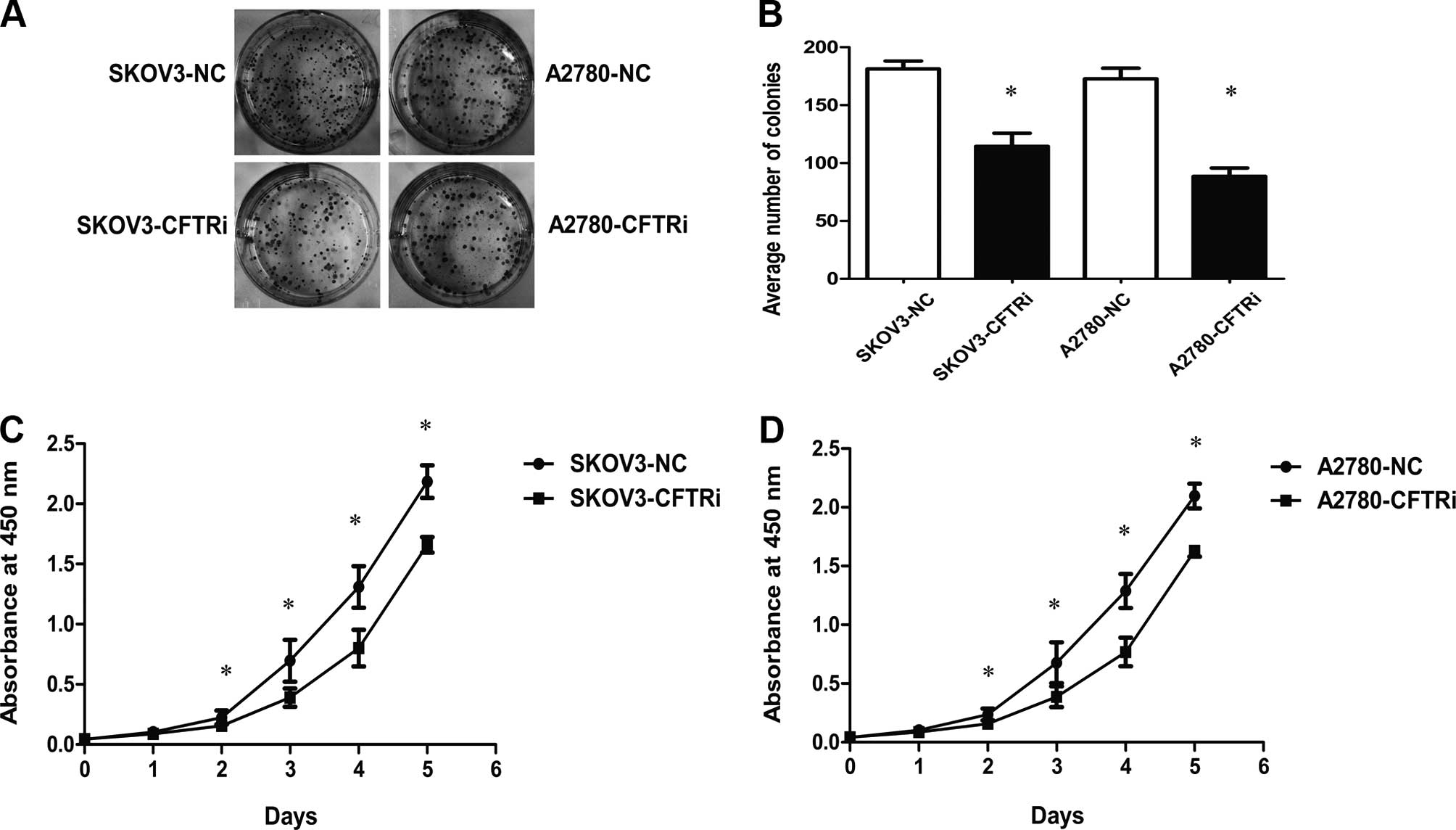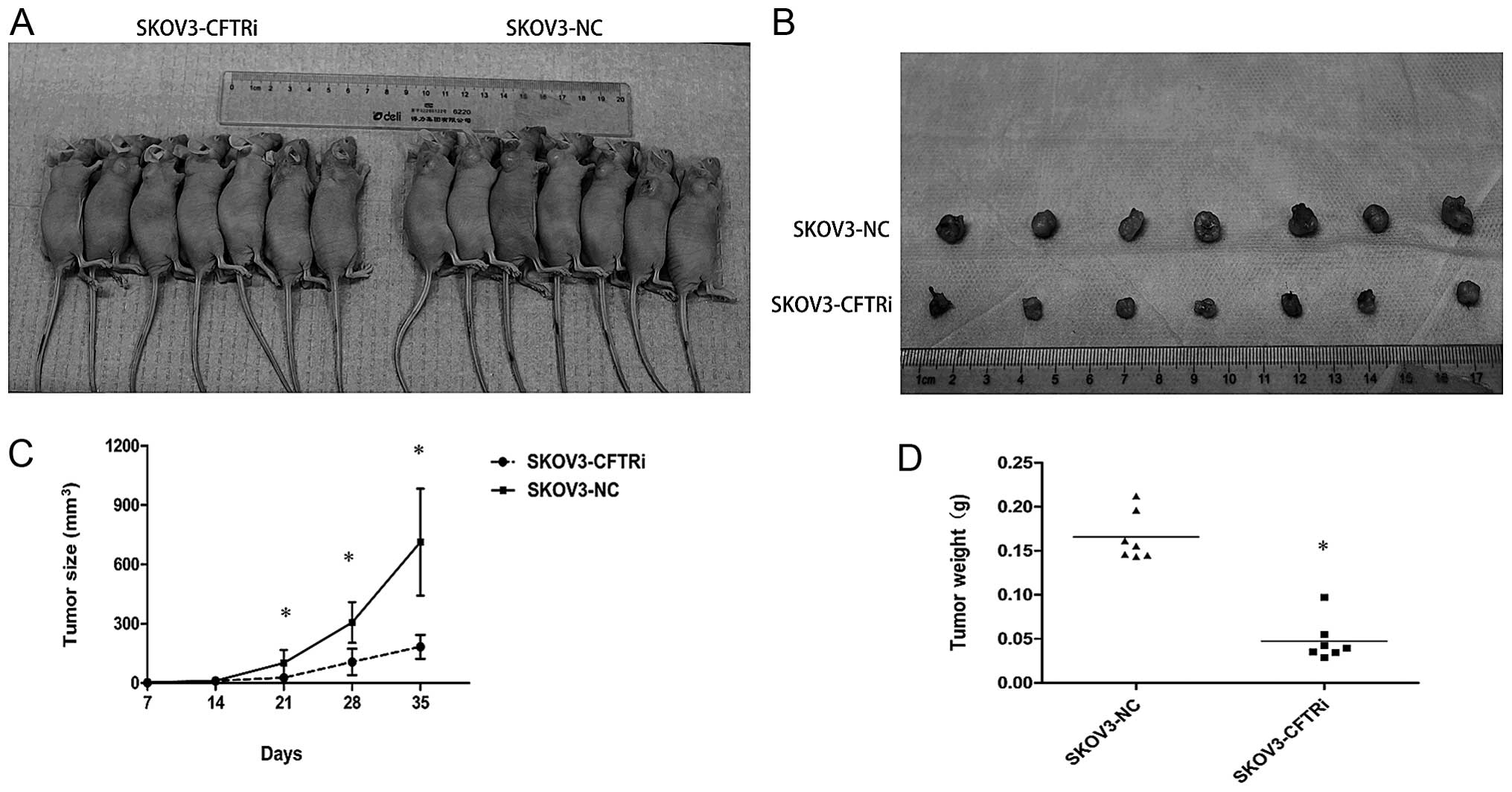|
1
|
Siegel R, Naishadham D and Jemal A: Cancer
statistics, 2013. CA Cancer J Clin. 63:11–30. 2013. View Article : Google Scholar : PubMed/NCBI
|
|
2
|
Rauh-Hain JA, Krivak TC, Del Carmen MG and
Olawaiye AB: Ovarian cancer screening and early detection in the
general population. Rev Obstet Gynecol. 4:15–21. 2011.PubMed/NCBI
|
|
3
|
Bear CE, Li CH, Kartner N, et al:
Purification and functional reconstitution of the cystic fibrosis
transmembrane conductance regulator (CFTR). Cell. 68:809–818. 1992.
View Article : Google Scholar : PubMed/NCBI
|
|
4
|
Tizzano EF, Silver MM, Chitayat D,
Benichou JC and Buchwald M: Differential cellular expression of
cystic fibrosis transmembrane regulator in human reproductive
tissues. Clues for the infertility in patients with cystic
fibrosis. Am J Pathol. 144:906–914. 1994.PubMed/NCBI
|
|
5
|
Schwiebert EM, Benos DJ, Egan ME, Stutts
MJ and Guggino WB: CFTR is a conductance regulator as well as a
chloride channel. Physiol Rev. 79(Suppl 1): S145–S166.
1999.PubMed/NCBI
|
|
6
|
Higgins CF: ABC transporters: from
microorganisms to man. Annu Rev Cell Biol. 8:67–113. 1992.
View Article : Google Scholar : PubMed/NCBI
|
|
7
|
Padua RA, Warren N, Grimshaw D, et al: The
cystic fibrosis ΔF508 gene mutation and cancer. Hum Mutat.
10:45–48. 1997. View Article : Google Scholar
|
|
8
|
Neglia JP, FitzSimmons SC, Maisonneuve P,
et al: The risk of cancer among patients with cystic fibrosis.
Cystic Fibrosis and Cancer Study Group. N Engl J Med. 332:494–499.
1995. View Article : Google Scholar : PubMed/NCBI
|
|
9
|
Mcwilliams RR, Petersen GM, Rabe KG, et
al: Cystic fibrosis transmembrane conductance regulator (CFTR) gene
mutations and risk for pancreatic adenocarcinoma. Cancer.
116:203–209. 2010.
|
|
10
|
Qiao D, Yi L, Hua L, et al: Cystic
fibrosis transmembrane conductance regulator (CFTR) gene 5T allele
may protect against prostate cancer: a case-control study in
Chinese Han population. J Cyst Fibros. 7:210–214. 2008. View Article : Google Scholar
|
|
11
|
Li Y, Sun Z, Wu Y, et al: Cystic fibrosis
transmembrane conductance regulator gene mutation and lung cancer
risk. Lung Cancer. 70:14–21. 2010. View Article : Google Scholar : PubMed/NCBI
|
|
12
|
Xie C, Jiang XH, Zhang JT, et al: CFTR
suppresses tumor progression through miR-193b targeting urokinase
plasminogen activator (uPA) in prostate cancer. Oncogene.
32:2282–2291. 2291.e1–2291.e7. 2013. View Article : Google Scholar
|
|
13
|
Zhang JT, Jiang XH, Xie C, et al:
Downregulation of CFTR promotes epithelial-to-mesenchymal
transition and is associated with poor prognosis of breast cancer.
Biochim Biophys Acta. 1833:2961–2969. 2013. View Article : Google Scholar : PubMed/NCBI
|
|
14
|
Wu Z, Peng X, Li J, Zhang Y and Hu L:
Constitutive activation of nuclear factor κB contributes to cystic
fibrosis transmembrane conductance regulator expression and
promotes human cervical cancer progression and poor prognosis. Int
J Gynecol Cancer. 23:906–915. 2013. View Article : Google Scholar : PubMed/NCBI
|
|
15
|
Jacquot J, Tabary O, Le Rouzic P and
Clement A: Airway epithelial cell inflammatory signalling in cystic
fibrosis. Int J Biochem Cell Biol. 40:1703–1715. 2008. View Article : Google Scholar : PubMed/NCBI
|
|
16
|
Au CW, Siu MK, Liao X, et al: Tyrosine
kinase B receptor and BDNF expression in ovarian cancers - effect
on cell migration, angiogenesis and clinical outcome. Cancer Lett.
281:151–161. 2009. View Article : Google Scholar : PubMed/NCBI
|
|
17
|
Wang J, Dai JM, Che YL, et al: Elmo1 helps
dock180 to regulate Rac1 activity and cell migration of ovarian
cancer. Int J Gynecol Cancer. 24:844–850. 2014. View Article : Google Scholar : PubMed/NCBI
|
|
18
|
Singh AP, Chauhan SC, Andrianifahanana M,
et al: MUC4 expression is regulated by cystic fibrosis
transmembrane conductance regulator in pancreatic adenocarcinoma
cells via transcriptional and post-translational mechanisms.
Oncogene. 26:30–41. 2007. View Article : Google Scholar
|
|
19
|
Peng X, Wu Z, Yu L, et al: Overexpression
of cystic fibrosis transmembrane conductance regulator (CFTR) is
associated with human cervical cancer malignancy, progression and
prognosis. Gynecol Oncol. 125:470–476. 2012. View Article : Google Scholar : PubMed/NCBI
|
|
20
|
Moyer BD, Denton J, Karlson KH, et al: A
PDZ-interacting domain in CFTR is an apical membrane polarization
signal. J Clin Invest. 104:1353–1361. 1999. View Article : Google Scholar : PubMed/NCBI
|
|
21
|
Brdicková N, Brdicka T, Andera L, et al:
Interaction between two adapter proteins, PAG and EBP50: a possible
link between membrane rafts and actin cytoskeleton. FEBS Lett.
507:133–136. 2001. View Article : Google Scholar : PubMed/NCBI
|
|
22
|
Wiener JR, Windham TC, Estrella VC, et al:
Activated Src protein tyrosine kinase is overexpressed in
late-stage human ovarian cancers. Gynecol Oncol. 88:73–79. 2003.
View Article : Google Scholar
|
|
23
|
Wiener JR, Nakano K, Kruzelock RP, Bucana
CD, Bast RC Jr and Gallick GE: Decreased Src tyrosine kinase
activity inhibits malignant human ovarian cancer tumor growth in a
nude mouse model. Clin Cancer Res. 5:2164–2170. 1999.PubMed/NCBI
|
|
24
|
Kim HS, Han HD, Armaiz-Pena GN, et al:
Functional roles of Src and Fgr in ovarian carcinoma. Clin Cancer
Res. 17:1713–1721. 2011. View Article : Google Scholar : PubMed/NCBI
|















